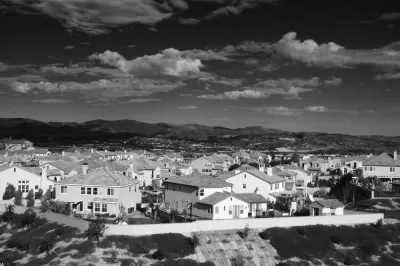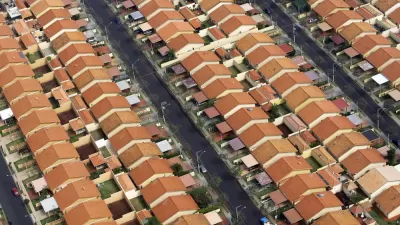A review of the recent "Future of Suburbia" event held at the Center for Advanced Urbanism at the Massachusetts Institute of Technology.

"Whether we are aware of it or not, even the most self-consciously curated 'urban' lives are staged and supplied by the jumbled realm of suburbia," begins an in-depth article by Amada Kolson Hurley examining the recent "Future of Suburbia" event held at the Center for Advanced Urbanism (CAU) at the Massachusetts Institute of Technology (MIT).
Unlike a previous article by Randy Rieland, Kolson Hurley's article offers a more critical reading of the event's proceedings, including the implied criticism of the event's single-minded support of a suburban agenda.
Also present, however, is a sympathetic ear toward the need to have a critical discussion about suburbia, rather than just falling back to the often-elitist biases assumed by self-proclaimed urbanists. "All in all, CAU is making a concerted bid to reposition suburbia as a serious subject of design inquiry," explains Kolson Hurley. "It couldn’t have come soon enough."
Among a detailed account of the event's proceedings, Kolson Hurley also makes a nuanced point about how the event's politics differs from the approache taken by "Reformers," who would retrofit suburbia. Instead, the CAU has created a space for "Validators":
They believe that suburbia is fundamentally OK. They maintain that when people have options, they will usually choose to live in a single-family home in the suburbs, and for intellectuals to resist this is classist and perverse. Validators point out (correctly) that the much-hyped urban revival we keep reading about is mostly limited to affluent white Gen Xers and Millennials. At the conference, economist Jed Kolko analyzed recent census data to show that on the whole, America continues to suburbanize.
To conclude the article, however, Kolson Hurley critiques that framework by noting the neglected subject of environmental impact of suburban land use. That criticism transitions into an appeal for further inquiry and continued effort at finding a common ground for "Reformers," "Validators," and urbanists alike.
FULL STORY: The “Future of Suburbia,” according to MIT

Maui's Vacation Rental Debate Turns Ugly
Verbal attacks, misinformation campaigns and fistfights plague a high-stakes debate to convert thousands of vacation rentals into long-term housing.

Planetizen Federal Action Tracker
A weekly monitor of how Trump’s orders and actions are impacting planners and planning in America.

In Urban Planning, AI Prompting Could be the New Design Thinking
Creativity has long been key to great urban design. What if we see AI as our new creative partner?

King County Supportive Housing Program Offers Hope for Unhoused Residents
The county is taking a ‘Housing First’ approach that prioritizes getting people into housing, then offering wraparound supportive services.

Researchers Use AI to Get Clearer Picture of US Housing
Analysts are using artificial intelligence to supercharge their research by allowing them to comb through data faster. Though these AI tools can be error prone, they save time and housing researchers are optimistic about the future.

Making Shared Micromobility More Inclusive
Cities and shared mobility system operators can do more to include people with disabilities in planning and operations, per a new report.
Urban Design for Planners 1: Software Tools
This six-course series explores essential urban design concepts using open source software and equips planners with the tools they need to participate fully in the urban design process.
Planning for Universal Design
Learn the tools for implementing Universal Design in planning regulations.
planning NEXT
Appalachian Highlands Housing Partners
Mpact (founded as Rail~Volution)
City of Camden Redevelopment Agency
City of Astoria
City of Portland
City of Laramie




























